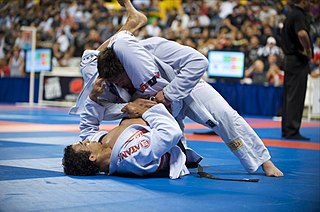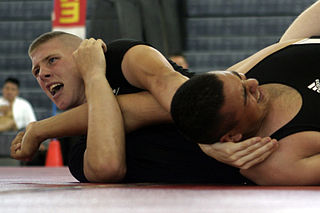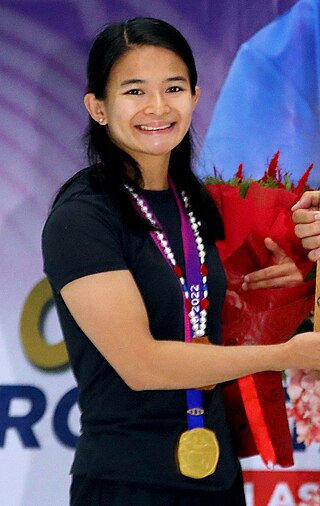Related Research Articles

Brazilian jiu-jitsu is a self-defence martial art and combat sport based on grappling, ground fighting, and submission holds. BJJ focuses on taking ones opponent down to the ground, gaining a dominant position, and using a number of techniques to force them into submission via joint locks or chokeholds.

Submission wrestling, also known as submission grappling, submission fighting or simply grappling, is a competitive martial art and combat sport that focuses on ground fighting and submission techniques. It is a hybrid discipline that incorporates elements of various grappling arts such as various wrestling styles, judo, and Brazilian jiu-jitsu. Submission wrestling is practiced both as a competitive sport and as a training method for self-defence and mixed martial arts (MMA).
Mario Yamasaki is a Brazilian mixed martial arts referee licensed in many states, most recognizable from his duties with the Ultimate Fighting Championship (UFC), as well as founder and chief instructor of the International Yamasaki Academy. Yamasaki is a veteran of over 400 fights in the UFC, Strikeforce, WEC, EliteXC and Pride Fighting Championships.
Raymond Stevens is a male retired judoka from the United Kingdom.

Wellington Leal Dias Santos, known by his nickname Megaton, is a Brazilian jiu-jitsu (BJJ) practitioner, and 7th degree coral belt of the Gracie Humaitá jiu-jitsu association under Royler Gracie. Wellington originally trained under Rogerio Camoes and later at the Gracie Humaitá jiu-jitsu school in Rio de Janeiro. Wellington received his black belt at the age of 18. Wellington is currently a coral belt under Royler Gracie.

Isao Okano is a retired judoka who competed in the middleweight division (–80 kg) in the 1964 Summer Olympics.
Arthur Alvin A. Aguilar is a Filipino martial artist and mixed martial arts promoter better known as Alvin Aguilar. He was born on April 28, 1974, in Bacolod, Philippines. He is the president and founder of the Universal Reality Combat Championship (2002–present); He is also the founder and head coach of DEFTAC Ribeiro Jiu-jitsu Philippines (1996–present.) and is currently serving as the president of the Wrestling Association of the Philippines. He started training in martial arts at the age of 9, first in Karate, Arnis and Greco-Roman wrestling. Having spent over 30 years of his life to the study of multiple martial arts forms including Sari-an, Brazilian jiu-jitsu, Yaw-Yan, Pekiti Tirsia Kali, etc., he has developed his own unique fighting style specialized in grappling, knife, and street fighting. He is also known for being the first home-grown Filipino Brazilian jiu-jitsu black belt.

Bibiano Fernandes da Silva Neto is a Brazilian professional mixed martial artist and black belt Brazilian jiu-jitsu (BJJ) practitioner. He fought in ONE Championship, where he is a former two-time ONE Bantamweight Champion and holds the record for most title fight wins (11) and is tied for most consecutive title defenses (7).
Travis Stevens is an American judoka who competed in the 2008, 2012, and 2016 Summer Olympics. He competes in the men's half-middleweight (−81 kg) division. On August 9, 2016, Stevens became the third American male judoka to win a silver medal in the Olympics.
Tim Carpenter is an American mixed martial artist who last competed in 2012.
Mariusz Ryszard Linke was a Polish professional mixed martial artist and grappler.

Kiyomi Watanabe is a Japanese-Filipino judoka who has represented the Philippines in international competitions including the 2020 Summer Olympics.
Leonardo "Leo" Leite is a retired Brazilian judoka, jiu jitsu practitioner, and mixed martial artist.
Kastriot "Georges" Mehdi was a French-born Brazilian judoka, considered one of the most prominent practitioners of judo in Brazil.
Maybelline Masuda is a Filipino Brazilian Jiu-Jitsu practitioner. She has earned the Philippines prestige by winning and becoming the first Filipino Brazilian Jiu-Jitsu World Champion as a white belt in 2009 and for winning the Country's 1st ever gold medal at the Asian Beach Games for Ju Jitsu in 2014.

Márcio "Macarrão" Stambowsky is a Brazilian martial artist. An 8th degree coral belt in Gracie Jiu-Jitsu, he is one of the "Famous Five" Rolls Gracie black belts. Regarded as one of the top Brazilian competitors of the 1980s, he is also the father of professional Bellator MMA fighter Neiman Gracie Stambowsky.
Maria Malyjasiak is a Polish Judoka, submission grappler and Brazilian jiu-jitsu (BJJ) black belt competitor.

Margarita "Meggie" P. Ochoa is a Filipino jujutsu practitioner. She competes both in Brazilian jiu-jitsu and the standard form of the discipline.

Annie Ramirez is a Filipino jujutsu practitioner. She competes both in Brazilian jiu-jitsu and the standard form of the discipline.
References
- 1 2 Navida, John Gray. "art II of MMA Philippines' Exclusive Interview with 6th Dan Judoka and BJJ Black Belt John Baylon". MMA Philippines. Retrieved 27 May 2018.
- 1 2 3 "That Time Filipino Judoka John Baylon Submitted Mike Fowler in a Judo Tournament". Eastern Europe BJJ. 29 May 2016. Retrieved 27 May 2018.
- ↑ Evans, Hilary; Gjerde, Arild; Heijmans, Jeroen; Mallon, Bill; et al. "John Baylon Olympic Results". Olympics at Sports-Reference.com. Sports Reference LLC. Archived from the original on 18 April 2020. Retrieved 26 May 2018.
- 1 2 3 Castillo, Musong (19 November 2011). "John Baylon's long judo reign ends". Philippine Daily Inquirer. Retrieved 27 May 2018.
- ↑ "7-time gold medalist Baylon to carry RP flag at 24th SEA Games". GMA News. 18 October 2007. Retrieved 27 May 2018.